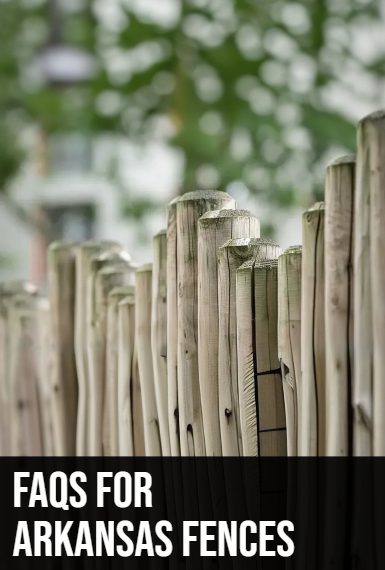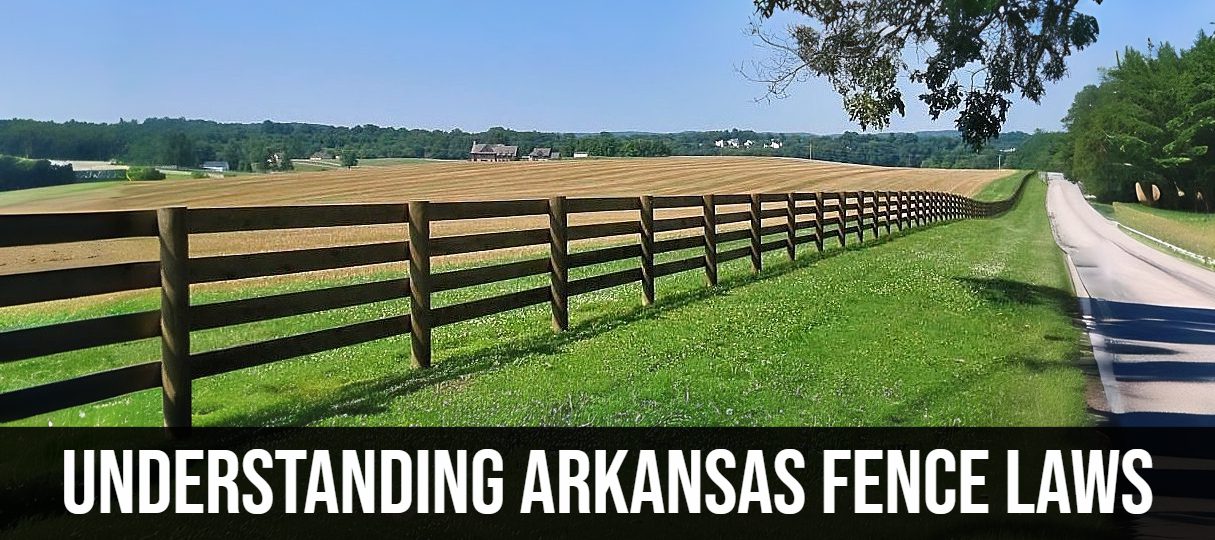
Arkansas Laws & Community Development:
Laws on Fences & Property Lines
In the great state of Arkansas, understanding fence laws is crucial not just for keeping the peace but for avoiding the kind of neighborhood drama that could make for a good daytime soap opera. Arkansas fence laws are essential for both residential property owners and agricultural landholders, impacting everything from where you can plunk down that white picket dream to how to handle wandering livestock.
Arkansas fence laws provide a clear framework on key issues such as property line definitions, permissible types of fences, and the responsibilities that come with owning a bit of the Earth. This legislation is like the rulebook for a neighborly game of “fence your yard,” helping everyone play nice and stay informed.
One of the primary headscratchers under Arkansas fence laws is figuring out where exactly one person’s land ends and another’s begins. This can be crucial for those looking to erect a new fence and can often lead to disputes reminiscent of a family reunion gone wrong. Arkansas law tries to keep things civil by requiring landowners to share the responsibility for building and maintaining boundary fences. If one party isn’t keen on splitting the bill, they’ll need to cough up the dough for a professional survey to mark those lines clearly.
Additionally, Arkansas fence laws get into the nitty-gritty of what type of fences are allowed. Since rules vary by county, it’s wise to do your homework before you start building anything that might end up being more of an expensive lawn ornament. Staying within the law helps keep the peace and prevents your fence project from becoming a local scandal.
Property owners must also ensure their fences don’t turn into neighborhood nuisances. This includes making sure they don’t pose safety hazards or block your neighbor’s favorite sunset view. And if you’re using your fence to keep in anything bigger than a breadbox—like livestock—you need to ensure those creatures don’t go on unsanctioned field trips.
Ignoring the Arkansas fence laws can lead to penalties ranging from fines to more dramatic courtroom showdowns. Staying on top of the rules not only helps you sidestep these issues but also preserves the harmony of your local community.
In conclusion, wrapping your head around the Arkansas fence laws can save you a lot of headaches and legal fees. Whether it’s avoiding a feud over a few feet of land or ensuring your cows stay put, a little legal legwork can go a long way. Keep informed, stay compliant, and maybe your fencing project will be the talk of the town for all the right reasons.
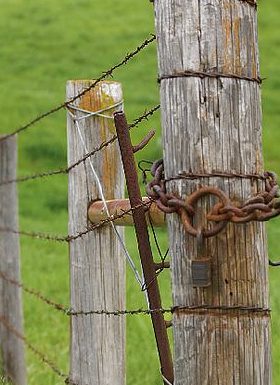
Adverse Possession & Arkansas Fence Laws:
Regulations You Need to Know
Adverse possession might sound like something out of a pirate movie, but it’s actually a very real legal principle that could allow someone to claim ownership of your land if they’ve cozied up on it long enough. In Arkansas, the magic number is seven years, thanks to the state’s specific requirements. This guide dives into how adverse possession intertwines with Arkansas fence laws, so if you’re a current or aspiring landowner, strap in—you’ll want to know this.
In the Natural State, the concept of “boundary by acquiescence” comes into play when neighbors have treated a non-official boundary as the real deal for at least seven years. After those seven years, this pirate’s agreement could turn into a legally recognized boundary line. Here’s where Arkansas fence laws become crucial: these fences often mark territories between properties. If your fence has accidentally or strategically wandered over to your neighbor’s property and stayed there for over seven years, you might just find yourself the legal owner of a bit more land than you started with.
Arkansas fence laws also have something to say about reducing risks. Say your property kisses a public road; you’ve got extra duties to keep that fence not just standing but also up to snuff—visible to motorists and sturdy enough to stop a wandering cow or two. Skimp on this, and you could be scripting the next big courtroom drama—or at least a hefty fine.
Height matters too. Under Arkansas fence laws, residential fences need to stand at least four feet tall, while those corralling livestock should reach a minimum of five feet. It’s all about keeping things safe and secure, for both two-legged and four-legged residents.
When fences do indeed make good neighbors, it usually means both sides are sharing the upkeep. Arkansas law encourages a communal approach to fence maintenance and liability. So, knowing your rights and responsibilities under Arkansas fence laws can save you from future headaches and legal wrangles.
But what if the neighborly chit-chat fails to resolve a fence feud? While we all hope it doesn’t come to this, sometimes you might have to call in the legal cavalry to settle disputes about who owns what or whose turn it is to wield the hammer and nails.
To wrap it up, staying savvy about Arkansas fence laws and the quirks of adverse possession can make the difference between a peaceful kingdom and an Arkansas property-line war. Keep your fences compliant, and your dialogue open. Managing your land wisely isn’t just about avoiding legal tussles; it’s about fostering a community where everyone knows where they stand—literally and legally.
Legally Erecting an Arkansas Fence:
Respecting Your Neighbors Property Line & Rights
Thinking about enclosing your property in Arkansas with a new fence? It’s more than just picking a style and digging in—there are legal steps and community guidelines to consider to keep things above board and neighbor-friendly. Here’s how you can navigate the Arkansas fence laws, zoning codes, and neighborly etiquette to ensure your fence project goes smoothly.
Start your fencing adventure by touching base with your local planning department. This team is your first stop for understanding what’s required under local zoning and permitting laws. You’ll likely need a fence permit, which ensures your fence adheres to local standards for height and materials, and respects boundary setbacks. Some areas may also require a building permit, especially in tightly regulated communities or historic districts.
Before you mark the ground for your first post, it’s crucial to pinpoint your property lines accurately. Misjudged boundaries can lead to disputes that turn neighborly chats into less friendly exchanges. A professional land surveyor can be worth their weight in gold here, especially in areas where natural landmarks or previous alterations make boundaries unclear.
Next, delve into the specifics of the Arkansas fence laws applicable to your area. While some localities follow state guidelines that promote shared responsibilities for boundary fences, this isn’t universal. Checking with local authorities can clarify whether you’re in a share-and-share-alike zone or if different rules apply to your fence.
Good fences might make good neighbors, but great neighbors communicate. Talking with those next door about your fencing plans isn’t just considerate—it’s strategic. This dialogue can prevent misunderstandings about boundary encroachments or design choices that might infringe on shared views or access. In Arkansas, keeping everyone informed can also sidestep legal complications like adverse possession, where a neighbor could claim a piece of your property through prolonged, uncontested use.
To wrap it up, building a fence in Arkansas requires more than just manual labor; it involves understanding local Arkansas fence laws, securing the right permits, accurately determining property boundaries, and fostering good relationships with your neighbors. Each community in Arkansas may have its own set of nuances, so don’t take a one-size-fits-all approach. By following these steps, not only will you ensure that your fence meets legal standards, but you’ll also maintain the peace and aesthetics of your neighborhood.
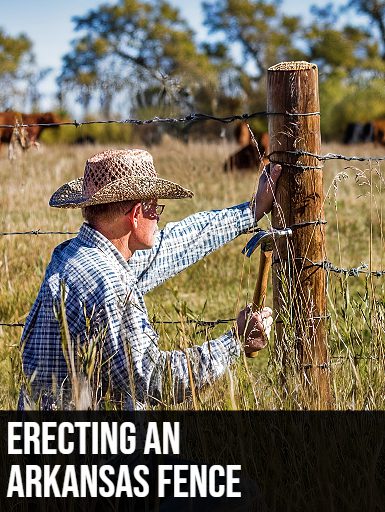
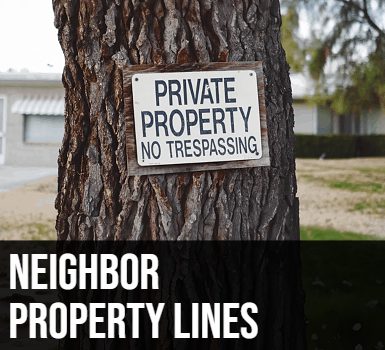
Arkansas Homeowner’s Guide: Laws on Fences,
Property Boundaries, & Neighbor Disputes
Arkansas Fence Height Regulations
| Zoning | AR Fence Height |
|---|---|
| Residential Standard | Fixed: 6 feet max |
| Residential Special Case | Fixed: 8 feet max |
| Agricultural Livestock Fencing | Variable: Depends on Livestock Type |
| Agricultural Perimeter | Variable: Depends on Property Needs |
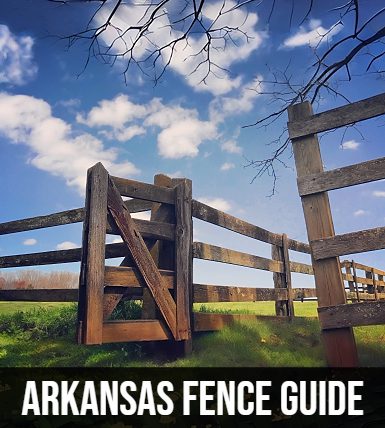
If you’re a homeowner in Arkansas, chances are you’ll eventually face the ultimate suburban showdown: the fence dispute. It’s practically a neighborhood sport around here! Knowing your way around Arkansas fence laws, property lines, and the fine art of neighborly diplomacy can keep you out of legal hot water and in good standing at the block party.
First things first: let’s crack the code on Arkansas fence laws. You have the green light to erect a fence right up to the edge of your property—just make sure it doesn’t wander over into your neighbor’s yard. Accidental land grabs are a classic recipe for neighborly beef, and believe me, it’s a dish best left uncooked.
Now, about those zoning laws. They’re like the homeowner’s rulebook—detailing what kind of fence you can build, how tall it can be, and what it’s made from. These local ordinances can be fussier than state laws, so make a call to your local zoning office to avoid any DIY disasters. Don’t forget the building permit, either. It’s your legal shield against future headaches, ensuring your new fence doesn’t accidentally turn into a community eyesore.
Let’s talk about a tricky little thing called adverse possession. Imagine if just by using your land, your neighbor could claim it as theirs after seven years. Sounds like a plot twist from a legal drama, right? Well, it’s all too real in Arkansas, so if you see a fence creeping over your line, it’s time to act—unless you’re okay with giving away bits of your backyard.
Communication is your secret weapon here. Before you start digging, why not pop over for a chat with your neighbor? A friendly heads-up about your plans can smooth over potential wrinkles and might even earn you a hand with the project. And if talking things out doesn’t work, it’s time to consider bringing in a professional, like a mediator or even a lawyer, to help draft a peace treaty—or at least a boundary agreement.
In short, navigating the fence laws in Arkansas doesn’t have to be a feud starter. With a little legal legwork, a dash of diplomacy, and a good sense of humor, you can put up that fence and keep your neighbors on your side. So, arm yourself with knowledge, keep communication lines open, and you’ll not only have a great fence but also great relations on either side of it.
Conclusion to Arkansas Fence Laws
Wrapping up the wild world of Arkansas fence laws, here’s the lowdown: knowing where your property ends and your neighbor’s begins can save you from a heap of trouble. Building a fence isn’t just about nailing some boards together; it’s about ensuring you’re on the right side of the law and your neighbor’s good graces. Share the fence-building love (and costs) with your neighbors, keep an eye on those local regs, and maybe avoid any Hatfield-McCoy reenactments.
Oh, and adverse possession? That’s just a fancy way of saying if your neighbor starts mowing your lawn for too long, they might just end up owning it. So, stay informed, keep things friendly, and let your fences be the stuff that good neighbors are made of. Remember, a good fence makes good neighbors, but a great fence keeps the legal headaches at bay. Happy fencing!
Frequently Asked Questions (FAQs)
1. What Do Arkansas Laws Say About Boundary Fences?
In Arkansas, neighbors share the responsibility for boundary fences. If your fence sits on the property line, both you and your neighbor split the costs and maintenance. To keep things friendly and avoid disputes, have a chat with your neighbor and agree on the terms. An upfront agreement can prevent headaches later. Plus, staying on good terms with the folks next door is always a bonus!
2. Who Has to Take Care of a Fence That Separates Two Properties in Arkansas?
In Arkansas, both property owners share the responsibility for maintaining a boundary fence. Regular maintenance and repairs are joint duties. Good communication is key—talk to your neighbor to agree on splitting the tasks and costs. A fair arrangement can prevent future disputes and keep your properties looking sharp. Good fences really do make good neighbors!
3. Is It Okay to Take Down a Boundary Fence Without My Neighbor’s Approval in Arkansas?
Absolutely not. In Arkansas, you need your neighbor’s permission before removing a boundary fence. Taking down a shared fence without consent can lead to legal troubles and liability for damages. Always talk to your neighbor first and get their agreement to maintain harmony and respect each other’s property rights.
4. What Does Adverse Possession Mean Under Arkansas Fence Laws?
Adverse possession allows someone to claim ownership of your property if they’ve used it without permission for a certain period. In Arkansas, this can be an issue if your neighbor has been using part of your land without your objection. Regularly check your property lines and address any encroachments promptly to avoid problems.
5. What Steps Should I Take If My Neighbor and I Can’t Agree on the Boundary Fence in Arkansas?
Start by discussing the issue with your neighbor to clear up misunderstandings. If that doesn’t work, consider hiring a professional surveyor to determine the exact property lines. Legal action should be the last resort. It’s best to settle things amicably to save time, money, and maintain good neighborly relations.
